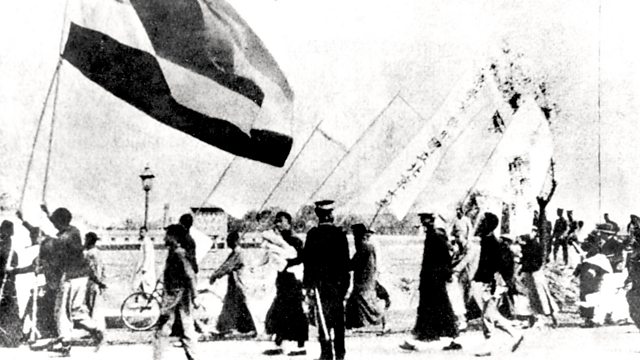The May Fourth Movement
Melvyn Bragg and guests discuss the upheaval in China in 1919 after humiliation in the Versailles Treaty and the sharing of ideas that led to the foundation of the Communist Party.
Melvyn Bragg and guests discuss the violent protests in China on 4th May 1919 over the nation's humiliation in the Versailles Treaty after World War One. China had supported the Allies, sending workers to dig trenches, and expected to regain the German colonies on its territory, but the Allies and China's leaders chose to give that land to Japan instead. To protestors, this was a travesty and reflected much that was wrong with China, with its corrupt leaders, division by warlords, weakness before Imperial Europe and outdated ideas and values. The movement around 4th May has since been seen as a watershed in China’s development in the 20th century, not least as some of those connected with the movement went on to found the Communist Party of China a few years later.
The image above is of students from Peking University marching with banners during the May Fourth demonstrations in 1919.
With
Rana Mitter
Professor of the History and Politics of Modern China and Fellow of St Cross College, University of Oxford
Elisabeth Forster
Lecturer in Chinese History at the University of Southampton
And
Song-Chuan Chen
Associate Professor in History at the University of Warwick
Producer: Simon Tillotson
Last on
More episodes
Previous
Next
LINKS AND FURTHER READING
READING LIST
Timothy Cheek, The Intellectual in Modern Chinese History (Cambridge University Press, 2015)
Joseph T. Chen, The May Fourth Movement in Shanghai: The Making of a Social Movement in Modern China (Brill, 1971)
Xiaoming Chen, From the May Fourth Movement to Communist Revolution (SUNY Press, 2008)
Eva Shan Chou, ‘Learning to Read Lu Xun, 1918-1923: The Emergence of a Readership’ (The China Quarterly 172, 2002)
Tse-tsung Chow, The May Fourth Movement: Intellectual Revolution in Modern China (Harvard University Press, 1960)
Milena Doleželová-Velingerová and Oldrich Král (eds.), The Appropriation of Cultural Capital: China’s May Fourth Project (Harvard University Asia Center, 2001), especially ‘Incomplete Modernity: Rethinking the May Fourth Intellectual Project’ by Leo Ou-fan Lee
Elisabeth Forster, 1919 - The Year That Changed China: A New History of the New Culture Movement (De Gruyter Oldenbourg, 2018)
Michael Gibbs Hill, Lin Shu, Inc.: Translation and the Making of Modern Chinese Culture (Oxford University Press, 2013)
Jerome B. Grieder, Hu Shih and the Chinese Renaissance: Liberalism in the Chinese Revolution, 1917–1937 (Harvard University Press, 1970)
Xiaobing Li and Qiang Fang (eds.), A Century of Student Movements in China: The Mountain Movers, 1919-2019 (Lexington Books, 2019), especially ‘Assessing Li Dazhao’s Role in the New Cultural Movement’ by Patrick Fuliang Shan
Rana Mitter, A Bitter Revolution: China’s Struggle with the Modern World (Oxford University Press, 2004)
Rana Mitter, Modern China: A Very Short Introduction (Oxford University Press, 2008)
Shakhar Rahav, The Rise of Political Intellectuals in Modern China: May Fourth Societies and the Roots of Mass-Party Politics (Oxford University Press, 2015)
Benjamin I. Schwartz, Reflections on the May Fourth Movement (Brill, 2020)
Vera Schwarcz, The Chinese Enlightenment: Intellectuals and the Legacy of the May Fourth Movement of 1919 (University of California Press, 1986)
Vera Schwarcz, Time for Telling the Truth Is Running Out: Conversations with Zhang Shenfu (Yale University Press, 1992)
Vera Schwarcz, ‘A Curse on the Great Wall: The Problem of Enlightenment in Modern China’ (Theory and Society 13, no. 3, 1984)
Hu Shih, The Chinese Renaissance: The Haskell Lectures, 1933 (University of Chicago Press, 1934)
Jonathan D. Spence, The Gate of Heavenly Peace: The Chinese and Their Revolution, 1895-1980 (Viking Press, 1981)
Jonathan D. Spence. The Search for Modern China (W. W. Norton & Company, 2001)
Jeffrey N. Wasserstrom, Student Protests in Twentieth-Century China: The View from Shanghai (Stanford University Press, 1991)
Timothy B. Weston, The Power of Position: Beijing University, Intellectuals, and Chinese Political Culture, 1898-1929 (University of California Press, 2004)
Lu Xun (trans. Julia Lovell), The Real Story of Ah-Q and Other Tales of China: The Complete Fiction of Lu Xun (Penguin, 2009)
Wen-hsin Yeh, Provincial Passages: Culture, Space, and the Origins of Chinese Communism (University of California Press, 1996)
Wen-hsin Yeh, The Alienated Academy: Culture and Politics in Republican China, 1919-1937 (Council on East Asian Studies, Harvard University, 1990)
RELATED LINKS
Broadcasts
- Thu 9 Dec 2021 09:00Â鶹ÊÓƵAV Radio 4
- Thu 9 Dec 2021 21:30Â鶹ÊÓƵAV Radio 4
Featured in...
![]()
20th Century—In Our Time
Browse the 20th Century era within the In Our Time archive.
![]()
History—In Our Time
Historical themes, events and key individuals from Akhenaten to Xenophon.
In Our Time podcasts
Download programmes from the huge In Our Time archive.
The In Our Time Listeners' Top 10
If you’re new to In Our Time, this is a good place to start.
Arts and Ideas podcast
Download the best of Radio 3's Free Thinking programme.
Podcast
-
![]()
In Our Time
Melvyn Bragg and guests discuss the ideas, people and events that have shaped our world.



